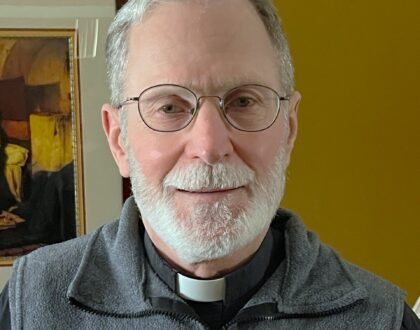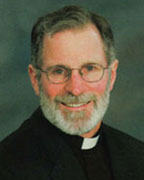Homily, Most Holy Body & Blood of Jesus

From The Pastor
It is difficult to understand why so many Catholics struggle to believe in the Real Presence of Jesus in the Eucharist. If a Christian professes Jesus as Lord and Christ, incarnate through the Virgin Mary in the power of the Holy Spirit, who freely died on a Cross to defeat evil and forgive all sin, who then rose from the dead out of perfect love for each of us personally and all of us inclusively, why is it hard for Jesus to give himself to us in consecrated bread and wine as his Body and Blood? If Christians believe that Jesus rose from the dead in the power of Divine love, why is it hard to believe He can give himself under the sacramental signs of bread and wine? Why would Jesus not want to be present to us, to be with us in this most personal way? Why would Jesus not want to give his love to us in the most personal way as to be eaten, consumed, ingested, and metabolized to become part of our bodies and souls? Why is the gift of the Real Presence of Jesus in the Eucharist such a challenge that statistically most Catholics do not believe in it?
There is nothing God cannot do. There is no place God cannot go. There is nothing God cannot heal, forgive, redeem, and unite to the Divine nature, except those who choose to be left out. Who wants to be left out? Is the Real Presence of Jesus in the Eucharist too much, too threatening, too close for comfort? This thought must be considered. Human beings in general and Christians in particular can often feel unworthy, guilt-ridden, and unforgiveable to accept so pure a love as the Real Presence of Jesus given to wayward sinners. If this is the case, the Church did too good a job of teaching the indelible mark of sin and its poison. This misses the Divine gift of human redemption in the unsolicited offer of God’s free and passionate desire to unite us and all creation through the Incarnate Son of God.
Presence is a quality and expression of human love. Why wouldn’t God offer the presence of Divine love for the sake of his beloved. If you are in love with another person, do you not hold an interior presence of awareness and desire for them when you are apart from each other? Do you not hold them in your heart longing for a time you will be together again? Do we not feel and hold the presence of our loved ones who have died close in our hearts? Of course we do. These are the bonds of love that hold us together through thick and thin, good times and bad, in grace and in failure. This is what love does.
Love is a hunger and the Bread of Love given in the Eucharist is real food that satisfies. The Eucharist is the most personal expression of the Lord’s desire to be with us always. This is not only for the sake of God’s love for us. It is also our deep need to regularly be nourished and strengthened in the love God offers. The Eucharist calls us to express our love for God with deep gratitude for the life given us in the presence of Jesus. The Eucharist is healing. It is profoundly relational. The Eucharist is called Holy Communion because it is the bond of love we share with God in the person of Jesus that draws us to share the same communion with one another.
Biblical movements throughout the Old Testament are the foundation that culminates in the new covenant in the blood of Christ. Covenant making through blood sacrifice as a commitment to God’s presence makes the Eucharist the pinnacle of the eternal covenant we now share with God through the dying and the rising of Jesus. Manna given to the hungry Israelites in the desert is a clear anticipation of the Eucharist to come. The story of Elijah and the widow of Zarephath when the jar of oil and the jug of flour never went empty until the rain came is another example. Also, the multiplication of loaves and fish to feed five thousand people is a direct reference to Jesus who is the Bread of life.
Today’s feast of the Body and Blood of Christ gives us the rich opportunity to ponder the mystery of the Eucharist in the presence of Jesus that unites us in the faith, hope, and love we profess. If you find the Eucharist and the Real Presence hard to understand, make it personal. Bring it down to your lived experience. Consider those whom you love, living or deceased, that you hold in your heart with awareness. Consider those who hold you in their heart with love and concern. If we, in the movements of our human love, hold a loving presence to our dear ones, how much more would Jesus be doing so for us.
God totally gives himself to us in the person of Jesus. Jesus, in the perfect love of the Father, gives himself for our sake to share union with God. We need this spiritual food for this earthly journey. Jesus is real food and real drink. It is the food of love poured out and freely given for our sake. If you believe in the dying and rising of Jesus for the forgiveness of sin that reconciles us to God, the Real Presence of Jesus in the Eucharist is an obvious step to believe in the immediacy of his love given us in this saving food.
Believe in the Real Presence. Receive with reverence and love. Allow the gift of the Holy Eucharist to fill you with love, joy, peace, and healing. It is true that we become what we eat. Allow the love of the Eucharist to transform you.
Father John Esper
Recent Sermons

Homily, March 30, 2025
March 27, 2025

Homily, March 23, 2025
March 20, 2025

Homily, March 16, 2025
March 11, 2025

